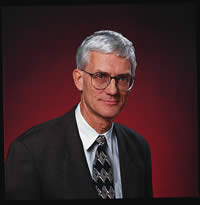Steering a Steady Course Through Transition
An unusual thing happened at the University of Washington this fall. We lost a president. The University over time has developed-tradition may be too strong a word-a habit of holding on to its presidents and not losing them to the presidential shuffle that occurs among universities competing for top leadership. But this fall, we lost Dick McCormick to Rutgers University.
There is a special reason why in this case we broke the habit. As President McCormick said when Rutgers tabbed him in its nationwide search for new leadership, the job at Rutgers was the only one for which he would even consider leaving the University of Washington. Dick grew up at Rutgers. His parents had their careers there. After graduate school, luck would have it that his first academic job was at Rutgers, where he remained for 16 years before moving to the University of North Carolina at Chapel Hill and then to our presidency seven years ago. The Rutgers offer was an opportunity for him to return to his roots, and the emotional and familial pull proved in the end to be irresistible.

Acting President Lee Huntsman, Photo by Mary Levin.
The University of Washington got a good seven years out of Dick McCormick. The legacy he leaves behind includes a campus culture believing in unlimited possibilities, even in a time of fiscal constraint; a first-rate leadership team in place to carry on the many new initiatives begun during his time here; an abiding and strong commitment to a diverse student body, faculty and staff; an insistence that the research and teaching missions of the University are inextricably combined, resulting in many new opportunities especially for undergraduates to participate in the process of discovery; and a determination to convince the state's elected policy makers that reinvesting in higher education is critical to the state's prosperity and its future.
The regents of the University will now commence the process to appoint the next UW president. Such processes usually take a fairly lengthy period of time to conclude and typically involve a broadly representative committee to assist the Regents in the search. In the meantime, the Regents have appointed me as interim president, and I hope by next fall the new president will be at her or his post.
 In the meantime, we will carry on the work of the University, in particular the major effort to convince the state of the need to fund its two research universities adequately. We have joined forces with our colleagues across the mountains in this effort because the chronic under-funding of our two institutions threatens both the educational and economic competitiveness of the state. This fall, WSU President Lane Rawlins and Dick McCormick together traveled the state with this message, and I will be picking up with Lane where Dick left off.
Two fiscal facts highlight the nature of the problem we face in state funding: for both the UW and WSU, state appropriations per full-time student, adjusted for inflation, declined substantially during the 1990s while funding at our peer universities rose nationwide. These diverging trends now leave WSU 19 percent worse off compared to its peers than it was in the early 90s. The UW is 21 percent worse off. In the current academic year, this translates to $2,600 per student, or more than $91 million total that we would be receiving if our state funding was at the average of our peers'.
Starting next month, state legislators will have to make some very difficult choices in a punishing economic climate. They, our alumni, and the public need to understand that further erosion of funding for the UW and WSU will have grave consequences for the future of the state.

Lee Huntsman, Acting President
Return to December 2002 "Briefings"
Return to December 2002 Table of Contents
|
 THE UNIVERSITY OF WASHINGTON ALUMNI MAGAZINE
THE UNIVERSITY OF WASHINGTON ALUMNI MAGAZINE
 THE UNIVERSITY OF WASHINGTON ALUMNI MAGAZINE
THE UNIVERSITY OF WASHINGTON ALUMNI MAGAZINE
